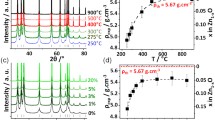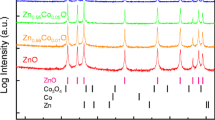Abstract
The hydrogen adsorption on surfaces and on defect sites of ZnO nanoparticles (NPs) has been studied by using Raman and Fourier transform infrared spectroscopic methods. The presence of hydrogen at defect sites bound to zinc vacancy with different coordinations has been confirmed. To further identify the existence of isolated VZn and H–VZn complexes in the ZnO NPs, coincidence Doppler broadening (CDB) spectroscopic studies have been performed with respect to the CDB spectra of a 99.9999% pure Al single crystal. The broad momentum dip ρL showed between 15–17 × 10−3 m0c suggests the trapping of positrons with the core electrons of 3p Zn. However, positron annihilation takes place between ρL 20–25 × 10−3 m0c and this may occur with an electron belonging to OH bonds (VZn–Hi–O). Here the lattice hydrogen H+ ion acts as a compensating centre, and it can bind with the VZn around the dislocation and stacking faults (SFs) core, which may produce the acceptor-type complex defect for p-type conductivity. Finally, the existence of SFs and dislocation defects, including edges and steps, was confirmed by transmission electron microscopy.






Similar content being viewed by others
References
Lyons JL, Janotti A, Van de Walle CG (2009) Why nitrogen cannot lead to p-type conductivity in ZnO. Appl Phys Lett 95(25):252105
Yi JB, Lim CC, Xing GZ, Fan HM, Van LH, Huang SL, Yang KS, Huang XL, Qin XB, Wang BY, Wu T, Wang L, Zhang HT, Gao XY, Liu T, Wee ATS, Feng YP, Ding J (2010) Ferromagnetism in dilute magnetic semiconductors through defect engineering: Li-doped ZnO. Phys Rev Lett 104(13):137201
Limpijumnong S, Zhang SB, Wei S, Park CH (2004) Doping by large-size-mismatched impurities: the microscopic origin of arsenic or antimony-doped p-type zinc oxide. Phys Rev Lett 92(15):155504
Herng TS, Lau SP, Wang L, Zhao BC, Yu SF, Tanemura M, Akaike A, Teng KS (2009) Magnetotransport properties of p-type carbon-doped ZnO thin films. Appl Phys Lett 95(1):012505
Pan H, Yi JB, Shen L, Wu RQ, Yang JH, Lin JY, Feng YP, Ding J, Van LH, Yin JH (2009) Room-temperature ferromagnetism in carbon-doped ZnO. Phys Rev Lett 99(12):127201
Tang K, Gu SL, Ye JD, Zhu SM, Zhang R, Zheng YD (2017) Recent progress of the native defects and p-type doping of zinc oxide. Chin Phys B 26(4):047702
Sahu R, Gholap HB, Mounika G, Dileep K, Vishal B, Ghara S, Datta R (2016) Stable p-type conductivity in B and N co-doped ZnO epitaxial thin film. Phys Status Solidi B 253(3):504–508
Park CH, Zhang SB, Wei SH (2002) Origin of p-type doping difficulty in ZnO: the impurity perspective. Phys Rev B 66(7):073202
Janotti A, Van de Walle CG (2009) Fundamentals of zinc oxide as a semiconductor. Rep Prog Phys 72(12):126501
Tan ST, Sun XW, Yu ZG, Wu P, Lo GQ, Kwong DL (2007) p-type conduction in unintentional carbon-doped ZnO thin films. Appl Phys Lett 91(7):072101
Zeng YJ, Ye ZZ, Xu WZ, Lu JG, He HP, Zhu LP, Zhao BH, Che Y, Zhang SB (2006) p-type behavior in nominally undoped ZnO thin films by oxygen plasma growth. Appl Phys Lett 88(26):262103
Hsu YF, Xi YY, Tam KH, Djurišić AB, Luo J, Ling CC, Cheung CK, Ching AM, Chan WK, Deng X, Beling CD, Fung S, Cheah KW, Fong PWK, Surya CC (2008) Undoped p-type ZnO nanorods synthesized by a hydrothermal method. Adv Funct Mater 18(7):1020–1030
Reynolds JG, Reynolds CL Jr, Mohanta A, Muth JF, Rowe JE, Everitt HO, Aspnes DE (2013) Shallow acceptor complexes in p-type ZnO. Appl Phys Lett 102(15):152114
Amini MN, Saniz R, Lamoeb D, Partoena B (2015) The role of the VZn–NO–H complex in the p-type conductivity in ZnO. Phys Chem Chem Phys 17(7):5485–5489
Karazhanov SZ, Marstein ES, Holt A (2009) Hydrogen complexes in Zn deficient ZnO. J Appl Phys 105(3):033712
Wardle MG, Goss JP, Briddon PR (2005) Theory of Fe Co, Ni, Cu, and their complexes with hydrogen in ZnO. Phys Rev B 72(15):155108
Lavrov EV, Weber J, Borrnert F, Van de Walle CG, Helbig R (2002) Hydrogen-related defects in ZnO studied by infrared absorption spectroscopy. Phys Rev B 66(16):165205
Herklotz F, Lavrov EV, Vl Kolkovsky, Weber J, Stavola M (2010) Charge states of a hydrogen defect with a local vibrational mode at 3326 cm−1 in ZnO. Phys Rev B 82(11):115206
Senthilkumar K, Tokunaga M, Okamoto H, Senthilkumar O, Fujita Y (2010) Hydrogen related defect complexes in ZnO nanoparticles. Appl Phys Lett 97(9):091907
Itohara D, Shinohara K, Yoshida T, Fujita Y (2016) p-Channel and n-channel thin-film-transistor operation on sprayed ZnO nanoparticle layers. J Nanomater 2016:8219326
Chen ZQ, Betsuyaku K, Kawasuso A (2008) Vacancy defects in electron-irradiated ZnO studied by Doppler broadening of annihilation radiation. Phys Rev B 77(11):113204
Jena P, Ponnambalam MJ, Manninen M (1981) Positron annihilation in metal-vacancy-hydrogen complexes. Phys Rev B 24(5):2884
Senthilkumar K, Senthilkumar O, Morito S, Ohba T, Fujita Y (2012) Synthesis of zinc oxide nanoparticles by dc arc dusty plasma. J Nanopart Res 14(10):1205
Chichibu SF, Onuma T, Kubota M, Uedono A, Sota T, Tsukazaki A, Ohtomo A, Kawasaki M (2006) Improvements in quantum efficiency of excitonic emissions in ZnO epilayers by the elimination of point defects. J Appl Phys 99(9):093505
Klason P, Børseth TM, Zhao QX, Svensson BG, Kuznetsov AY, Bergman PJ, Willander M (2008) Temperature dependence and decay times of zinc and oxygen vacancy related photoluminescence bands in zinc oxide. Solid State Commun 145(5–6):321–326
Reynolds DC, Look DC, Jogai B, Nostrand JEV, Jones R, Jenny J (1998) Source of the yellow luminescence band in GaN grown by gas-source molecular beam epitaxy and the green luminescence band in single crystal ZnO. Solid State Commun 106(10):701–704
Li M, Xing G, Xing G, Wu B, Wu T, Zhang X, Sum TC (2013) Origin of green emission and charge trapping dynamics in ZnO nanowires. Phys Rev B 87(11):115309
Kaschner A, Haboeck U, Strassburg M, Strassburg M, Kaczmarczyk G, Hoffmann A, Thomsen C, Zeuner A, Alves HR, Hofmann DM, Meyer BK (2002) Nitrogen-related local vibrational modes in ZnO:N. Appl Phys Lett 80(11):1909
Clemmer DE, Dalleska NF, Armentrout PB (1991) Reaction of Zn+ with NO2. The gas-phase thermochemistry of ZnO. J Chem Phys 95(10):7263
Bundesmann C, Ashkenov N, Schubert M, Spemann D, Butz T, Kaidashev EM, Lorenz M, Grundmann M (2003) Raman scattering in ZnO thin films doped with Fe, Sb, Al, Ga, and Li. Appl Phys Lett 83(10):1974
Haboeck U, Hoffmann A, Thomsen A, Zeuner A, Meyer BK (2005) High-energy vibrational modes in nitrogen-doped ZnO. Phys Status Solidi (b) 242(3):R21–R23
D’Amico KL, McFeely FR, Solomon EI (1983) High resolution electron energy loss vibrational studies of carbon monoxide coordination to the (10-10) surface of zinc oxide. J Am Chem Soc 105(21):6380–6383
Nickel NH, Fleischer K (2003) Hydrogen local vibrational modes in zinc oxide. Phys Rev Lett 90(19):197402
Mann MM, Hustrulid A, Tate JT (1940) The ionization and dissociation of water vapor and ammonia by electron impact. Phys Rev 58(4):340
Lu X, Xu X, Wang N, Zhang Q, Ehara M, Nakatsuji H (1999) Heterolytic adsorption of H2 on ZnO (10-10) surface: an ab initio SPC cluster model study. J Phys Chem B 103(14):2689–2695
Davidson JM, Sohail K (1995) A DRIFTS study of the surface and bulk reactions of hydrogen sulfide with high surface area zinc oxide. Ind Eng Chem Res 34(11):3675–3677
Scarano D, Spoto G, Bordiga S, Zecchina A (1992) Lateral interactions in CO adlayers on prismatic ZnO faces: a FTIR and HRTEM study. Surf Sci 276(1–3):281–298
Wang Y, Meyer B, Yin X, Kunat M, Langenberg D, Traeger F, Birkner A, Woll C (2005) Hydrogen induced metallicity on the ZnO (10-10) surface. Phys Rev Lett 95(26):266104
Brandt MS, Ager JW III, Gotzt W, Johnson NM, Harris JS Jr, Molnar R, Moustakas TD (1994) Local vibrational modes in Mg-doped gallium nitride. Phys Rev B 49(20):14758
Fabbri F, Villani M, Catellani A, Calzolari A, Cicero G, Calestani D, Calestani G, Zappettini A, Dierre B, Sekiguchi T, Salviati G (2014) Zn vacancy induced green luminescence on non-polar surfaces in ZnO nanostructures. Sci Rep 4:5158
Koßmann J, Hattigb C (2012) Investigation of interstitial hydrogen and related defects in ZnO. Phys Chem Chem Phys 14(47):16392–16399
Limpijumnong S, Zhang SB (2005) Resolving hydrogen binding sites by pressure—a first-principles prediction for ZnO. Appl Phys Lett 86(15):151910
Čížek J, Žaludová N, Vlach M, Daniš S, Kuriplach J, Procházka I, Brauer G, Anwand W, Grambole D, Skorupa W, Gemma R, Kirchheim R, Pundt A (2008) Defect studies of ZnO single crystals electrochemically doped with hydrogen. J Appl Phys 103(5):053508
Guo W, Allenic A, Chen YB, Pana XQ, Che Y, Hu ZD, Liu B (2007) Microstructure and properties of epitaxial antimony-doped p-type ZnO films fabricated by pulsed laser deposition. Appl Phys Lett 90(24):242108
Ding Y, Yang R, Wang ZL (2006) Ordered zinc-vacancy induced Zn0.75Ox nanophase structure. Solid State Commun 138(8):390–394
Jacobs R, Zheng B, Puchala B, Voyles PM, Yankovich AB, Morgan DJ (2016) Counterintuitive reconstruction of the polar O-terminated ZnO surface with zinc vacancies and hydrogen. Phys Chem Lett 7(22):4483–4487
Author information
Authors and Affiliations
Corresponding author
Electronic supplementary material
Below is the link to the electronic supplementary material.
Rights and permissions
About this article
Cite this article
Senthilkumar, K., Yoshida, T. & Fujita, Y. Formation of D–VZn complex defects and possible p-type conductivity of ZnO nanoparticle via hydrogen adsorption. J Mater Sci 53, 11977–11985 (2018). https://doi.org/10.1007/s10853-018-2498-7
Received:
Accepted:
Published:
Issue Date:
DOI: https://doi.org/10.1007/s10853-018-2498-7




